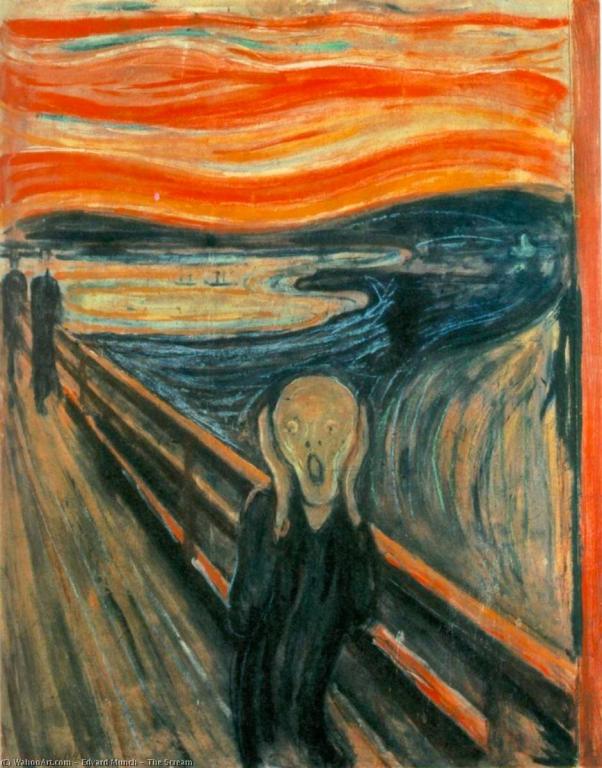Does it seem to you that our society is mentally ill?
Unhinged leaders, senseless violence, and irrational behavior are part of every news cycle. Paranoia, delusion, projection, obsession, anti-social psychosis–these clinical terms are descriptive of our politics and government, our social media and our opinions. And, on the individual level, who hasn’t been plagued by anxiety, depression, and hopelessness?
There is a word for what happens when the society and the people in it seem to have lost their collective minds: Anomie.
The word literally means “lawlessness,” not in the sense of violating laws but of not having any. “Normlessness” may be a better synonym, trying to live in a society that has no “norms,” no accepted standards of any kind. Here is the dictionary definition of anomie: “social instability resulting from a breakdown of standards and values. . . .personal unrest, alienation, and uncertainty that comes from a lack of purpose or ideals.“
The concept derives from the work of Émile Durkheim (1858-1917), the father of the discipline of sociology. He saw anomie as a consequence of the rapid social change and economic displacement brought on by the industrial revolution of the 19th century, as populations shifted from the close communities of rural villages into depersonalized cities and their work changed from farming and skilled crafts to mechanized factories. In his study of suicide, Durkheim saw anomie as a major factor when people kill themselves.
As historian Patrick Leech explains, Durkheim saw anomie as being the result of “massive socio-cultural changes, such as industrialization and modernization. According to Durkheim, these processes stripped an individual’s life of meaning and purpose, while displacing them from traditional social support networks. Thus, societies suffering from anomie exhibited markers of personal dissatisfaction, such as high rates of suicide, divorce, and alcoholism.”
Leech has written a guest post for Patheos blog Anxious Bench entitled The Growing Crisis of Anomie in the United States: Learning from Hungary’s Cold War Past. He argues that the anomie that afflicts Western culture today can be directly related to the rise of secularism.
He begins with a thought experiment raised by another scholar: “What would be the consequence if all religious institutions in society shutdown today?” Leech says that “we know the consequences of what would happen if all religious institutions shutdown because it happened in Hungary.”
Before the war, Hungary was officially Catholic, with significant Reformed and Lutheran minorities. Churches were very influential and powerful, though charges of corruption and collaboration with unpopular governments began to alienate much of the population. When communism was imposed on the country, religious institutions of all kinds were suppressed and silenced.
In 1956, Hungarians rose up against Communism, but the revolution was brutally put down by the Soviet Union. Afterwards, though, Hungarian communists implemented reforms, including some free-market practices, designed to give citizens a higher standard of living. But the loosening up did not apply to religion, which was still restricted by the state. Comments Leech,
Although these programs succeeded economically, they coincided with drastic increases in alcoholism, drug abuse, and suicide. By the early 1960s, Hungarians experienced the world’s highest rates of suicide—including among children and adolescents—and remained atop that list for two decades, a rate which rose by 70%. During this same period, alcohol consumption and alcohol-related deaths dramatically increased, as did other indicators of social fragmentation, like divorce and drug abuse.
In 1977, after trying everything else, “the state cited these social problems as justification for readmitting religious institutions into civil society, despite the party’s persistent opposition to religion.” The state began to allow religious institutions to operate. Churches started ministries to address social problems. Evangelists, including Billy Graham, were allowed into the country. Sometimes church leaders showed up!
“These efforts did not magically fix the problems in Hungarian society,” says Leech. “Rather, they seem to have injected a slow-acting antidote: hope. While hope is hard to quantify, the plateauing rate of suicide suggests these programs blunted despair.”
After the fall of communism, churches have again assumed their influential role. Now 80% of the population considers themselves to be Christians, though only 15% go to church regularly. Though Leech doesn’t go into this, the controversial prime minister Viktor Orbán presents himself as a defender of Christian values and describes his rather illiberal and authoritarian ideology as “Christian Democracy.”
Leech concludes,
While the causes may differ from those of socialist Hungary, these symptoms sound eerily familiar. The United States is facing high rates of suicide, along with abuse of drugs and alcohol, sometimes in the toxic mix labelled “deaths of despair.” Some people exhibit the social dislocation of anomie through grievance or intolerance. The most tragic examples of this phenomenom include young men, who commit acts of mass violence, like the shootings in Buffalo and Uvalde. Additionally, many recent books anchor today’s political and social hyperpolarization to social fragmentation.
Certainly, we are enduring much social change apart from religion–such as the technology revolution, economic dislocations, and the decline of the family–that no doubt also contribute to anomie. But certainly, in Durkheim’s terms, the loss of religion, almost by definition, “stripped an individual’s life of meaning and purpose, while displacing them from traditional social support networks.”
The breakdown of the family–evident not only in divorce but in the new phenomena of people now refusing to get married and refusing to have children–is certainly a major contributor to anomie, the family being the ultimate “social support network.” But the breakdown of the family is related to the breakdown of norms regarding sexuality, which, in turn, is connected to the breakdown of the church.
Even many of those who hold to a religion see it not so much in terms of belonging to a community of fellow-believers, who constitute a support system, but as a private, interior experience. Thus, many congregations are less of a community than they used to be.
So could it be that our current anomie–that is to say, the madness rampant in our society and the dysfunctions of those who participate in it–could be the direct result of the decline of religion? Is anomie the inevitable price of secularism?
Illustration: Edvard Munch, “The Scream,” CC0, via Wikimedia Commons














